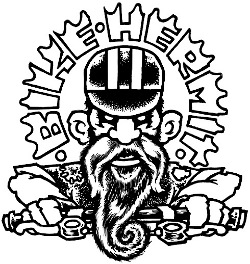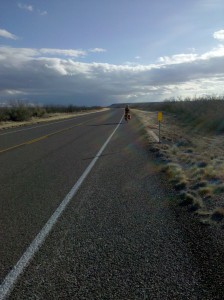If you ship your bike home from the end point of your tour, you will probably have removed you seat post and saddle in order to fit the bike into whatever case you used. When you get home and are putting the bike back together you will want to end up with the saddle at the same height relative to the pedals as it was when you took it off. A simple way to ensure that is, before you remove it, to wrap a piece of tape (electrical tape works best) around the seat post where it enters the frame. Then, when you put it back, just insert the post to the same spot.
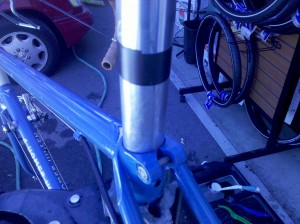
An aluminum seat post inserted into a steel frame will result in galvanic corrosion between the two metals. If not removed and cleaned and re-lubed periodically the seat post will become well and truly stuck and may need to be cut out. Removing it for a period of time will also allow any moisture which might be in the frame tubes to evaporate. Applying grease to the inside of the seat tube rather than to the seat post results in less of the goop squished out onto exposed bits and ending up on your clothes.
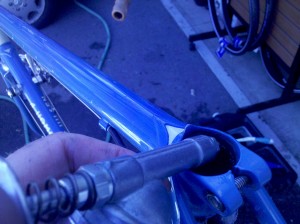
Don’t use grease on a carbon post or with a carbon frame. Use a special paste made for this purpose. The paste won’t damage the carbon and it has a little bit of grit to it that will help hold the post in place without over tightening.
Author: Bike Hermit®
Bike Preventive Maintenance
I was pinned down in Orberlin, LA by thunderstorms on my recent Austin to New Orleans Tour. Luckily I had a nice dry and warm storage shed at the fire station in which to store my gear. (I ended up sleeping there too, but that’s for another story) So I took the opportunity to do a little preventive maintenance. It’s much easier to fix a loose bolt or other potential problem when you have the time and the the place than it is to repair a failed part along the road when it’s getting dark. 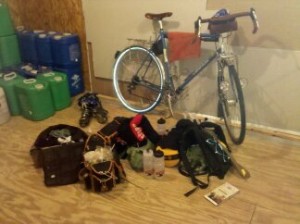
Removing all the luggage makes it easier to inspect bike and accessories. After checking the tightness of all the rack attachment bolts and fender mounts, I also go through the bike and tighten the stem bolts, seatpost bolt, brake lever and brake caliper bolts, derailleur attachment bolts and chainring bolts. Then I lube the chain. I turn the bike upside down and place it on the floor resting on the handlebars and saddle. Then I can visually inspect the tires for cuts or abrasions, and spin the wheels to check alignment. Like the man said,”an ounce of prevention is worth a pound of cure“.
The so-called paleo diet or caveman diet is a low carb high protein diet claimed by some to be a good way to lose weight. It has some proponents in the bicycling world too. One needs to be careful when considering extreme changes in their diet or just extremes in general. Bike touring is very demanding and your body is another piece of equipment you need to depend on. I was reading this thread on Bike Forums this morning. Try to ignore the name calling from the original poster and read the rest of the posts. Interesting stuff.
Gary Taubes is the latest proponent of a high protein low carb diet. From his blog: “My message and the message of Why We Get Fat was not that we should all be eating nothing but animal products–…… but that carbohydrate-rich foods are inherently fattening, some more so than others, and that those of us predisposed to put on fat do so because of the carbs in the diet“. (emphasis added). Mostly he is talking to obese or overweight people or people with that metabolic tendency and it might be easy to see him as a person feeding on people’s desire for a quick and easy way to lose weight.
I wonder if anyone has personal experience with a high protein low carb diet and bike touring? We’d love to hear about it!
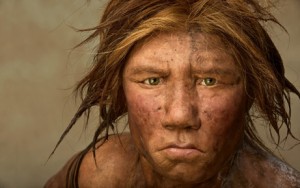
Bike Touring and Clothing
What are the basic essential articles of clothing needed for a successful bike tour? Obviously it depends on the season and local climate. My last three trips have been in late winter in the southern and southwestern US. Still, it can get cold…down to 25 degrees in Marathon Texas last year. And rain and even snow are always possibilities. So I carry what I consider to be the bare necessities for comfort without going overboard and bringing too much.
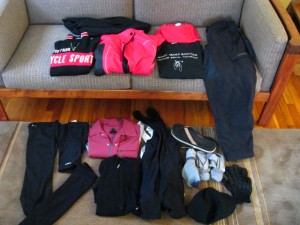
At the top I have long johns and a long sleeve polypropylene t-shirt. The long johns and sometimes the long sleeve t for sleeping on the cold night. I have a Woolistic brand wool trainer, a rain jacket, this happens to be a Bellwether, a long sleeve cotton t-shirt and some Endura Humvee pants made out of nylon.
On the floor, wool leg and arm warmers and a pair of knee warmers, a Club Ride jersey and a Surly wool jersey, riding shorts (yes, I prefer bibs), flip flops, for the inevitable gross showers and for hanging out, socks, (I carry 2 or 3 pairs of undershorts too), a wool cap and gloves. When I’m riding I, of course, wear my helmet and bike shoes.
Every two or three days I can hit a laundromat and wash everything. In a pinch I can wash the basics in the shower at night and hang them to dry. Even though my trips of late have been shorter than 3 weeks, I don’t think I would need to carry much more even if I were going for 3 months.
You Ask Me What I Like About Texas
Every person has different specific nutritional needs. Some basic ideas about fuel for muscles during and after exercise cannot be easily disregarded. There is some noise being made in the cycling world about the so called paleo diet which poo poos the need for carbohydrates in the form of grains and potatoes. This may be OK for the relatively sedentary person whose physiology makes it easy for them to put on pounds. But for the person pedaling a loaded touring bike for several hours each day complex and simple carbohydrates are essential. Carbohydrates provide the fuel your muscles will need in order to fire hour after hour. No carbohydrates, no fuel and no pedals going round. The purpose of protein is to rebuild the muscle tissue being torn down by the exercise. This happens after you stop exercising. The body human is amazingly adaptive to training, and the muscles will be rebuilt stronger than before and with a greater ability to use oxygen and thus greater endurance. I’m no expert or professional in medicine or nutrition but I suggest being careful with fads. Watch this series of videos if you are interested.
http://www.youtube.com/watch?v=OdBDQdOKbJQ
When I’m touring I like to carry enough food to last for about 36 hours. Because you never know when you might be able to buy groceries again. And I have a fear of getting stranded in the middle of nowhere without enough fuel to get to the next store or restaurant. Even in what one might think are relatively populated areas there might not be anyplace to get decent food. If you are lucky, maybe you can survive and thrive on hot dogs and chocolate milk and cupcakes from convenience stores, and there never seems to be a shortage of those.
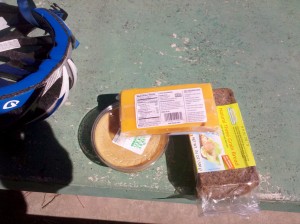
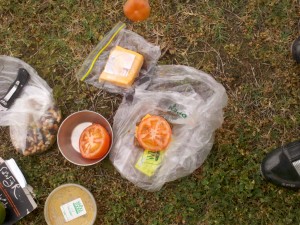
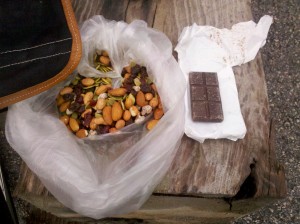
I will also take pasta in the form of quick cooking thin spaghetti. Throw in a few veggies when it is almost cooked and voila, pasta primavera. That works out most of the time, unless there happen to be some ghosts who don’t appreciate your presence as happened to me recently in Merryville, LA. With this result:
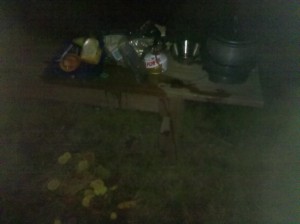
I also take powdered milk and muesli. Great for breakfast or emergency meals. Dried soup (I like the Nile Spice brand) can be taken out of the container and carried in zip lock bags. Light, easy to pack, carry and to cook. Lastly, at least one emergency ration of a freeze dried meal or a meal in a boil and eat package.
Basically, I try to bring food that packs the most punch for the pound and that is easy to prepare. Fresh fruits and vegetables are a bonus but they’re hard to carry, so when I find them I buy what I can eat on the spot, or if I am at the day’s stop, what I need for dinner.
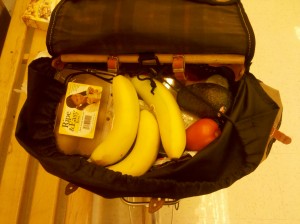
I had a question from a customer about actual widths for some models of the Schwalbe Marathon tires we carry. He is concerned about getting tires that will fit without rubbing on his fenders. I figure others probably have the same questions, so I have compiled a chart showing the actual measurements of some of the tires we carry. I will be updating and adding to the list. If there is a tire you want to know about, and it is not shown, just post it on the comments and I will try to provide actual dimensions for you.
I was going to go into some detail about tire sizing nomenclature but, as usual, the late great Sheldon Brown does a better job than anybody else could. So if you are unsure about what the size markings on your tires mean, check out Sheldon’s page.
All tires will be marked or stamped with the size. 700c and 28″ are two different nomenclatures for the same diameter.
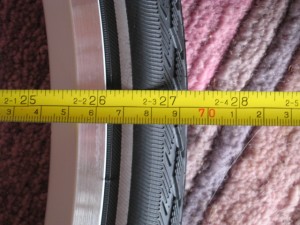
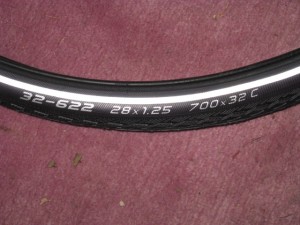
The ISO/ERTRO number is the most important in determining if a tire will fit on a particular rim. The second number in the pair is the diameter of the rim measured where the tire bead will seat.
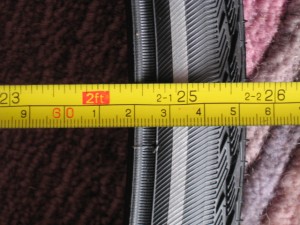
So called 29’r tires fit on rims with an ERTRO diameter of 622, but generally have a more voluminous casing so the overall diameter and widths will be greater.
So on to the Tire Width Chart. I measured the width of the inflated tire with a pair of calipers. The “height” is measured from the outer edge of the rim to the road contact surface of the inflated tire.
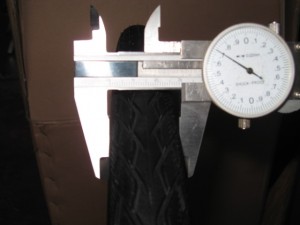
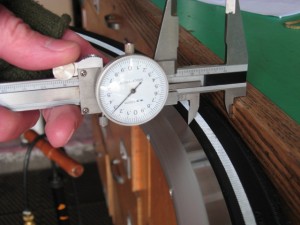
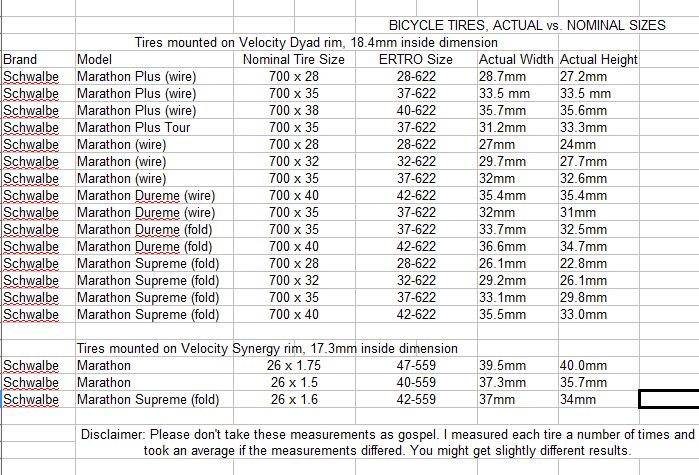
Sky King’s take on Austin
While much of our time in Austin was spent inside at the North American Handmade Bicycle Show, we did get out and about a bit. Most of these photo’s were taken with my phone but thought it would be fun to give you a little view of some of the things we saw.
I must confess, on day one, we observed a gentleman riding his bicycle wearing nothing but a G-string, way too much information for us. Needless to say we decided no one else needed to be exposed to that either.
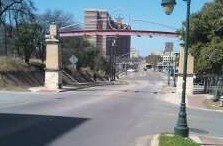
As a bit of a history nut, I imagine this Arch as an entrance to East Austin that the community installed to declare a neighborhood existence beyond downtown Austin. Now somewhat drawfed by I35 it still stands with pride.
Also in East Austin was this funky neighbor music venue and some interesting tiled mosaic murals.
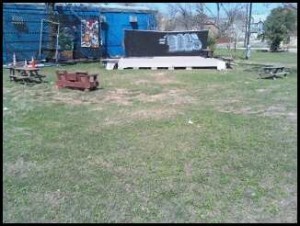

Eating at Scholz Garten, was a treat, Only a few blocks from the stadium where the Texas Longhorns play basketball, the place was packed with people wearing orange t-shirts with longhorns but cleared out quickly once the game commenced. Scholz was established in 1866 and prides itself in serving German Food but they also make a pretty decent pulled pork sandwich!
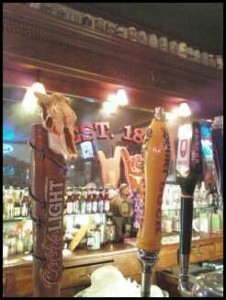
Our “go to” beer in Austin quickly became the Live Oak Big Bark, interesting taste, not real hoppy and a bit of blend between a black IPA and a Red Ale. Of course Jim could probably go into way more detail, but I just drink them.
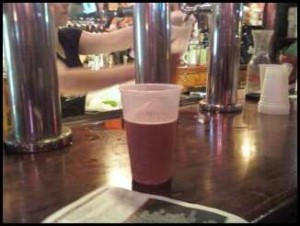
Mellow Johnny’s was a big supported of the North American Handmade Bicycle show. They hosted a huge party Friday night but didn’t have honky tonk so we cruised the shop and then departed. We are happy to say they are a dealer for Zimbale North America and had the bags displayed beautifully. To bad this photo doesn’t do justice to this bike. Similar to the Surly Big Dummy and Mellow Johnny’s decked it out with propane hot plate and mixing bowls – was pretty entertaining. The panniers are Giant – could probably stuff two kids, all the groceries and the kitchen sink.
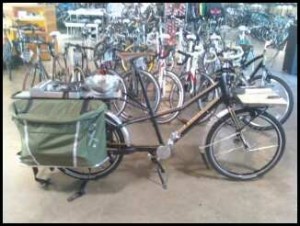
The Bike Hermit has the highest metabolism of anyone I know so finding Whole Foods was on the top of the list. The Austin store is the flag ship and a must visit for anyone who goes to Austin. I thought this “desert” stream in their landscaping was quite pleasant and deserving of a photo.
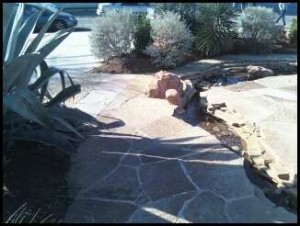
As I failed to do much research prior to our trip regarding bike rental options, I was the queen of walking. BUT just so you know, Austin Bike Tours and Rentals not only rents bikes they deliver and pick them up when you are done – DANG
I walked past this very clever bike rack, if you have any old frames in your garage, just weld them together!
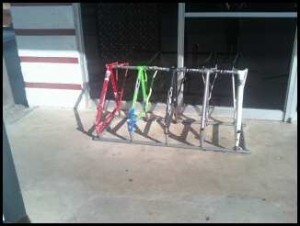
While the Bike Hermit is exploring Texas and Louisiana, he is journaling on Crazy Guy on A Bike. Here are a few photos and the link to his Journal
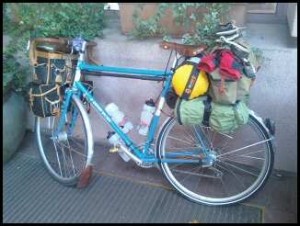

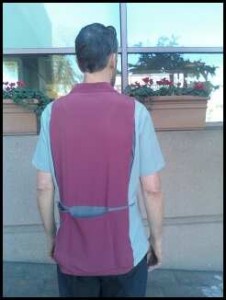
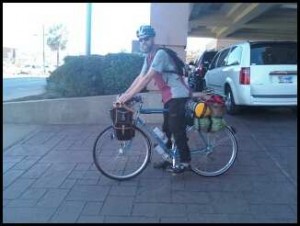
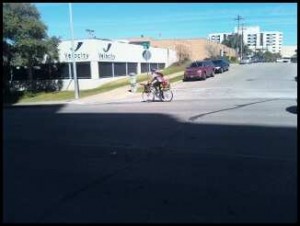
At NAHBS in Austin we met Russ Roca and Laura Crawford, the couple behind The Path Less Pedaled and The Epicurean Cyclist
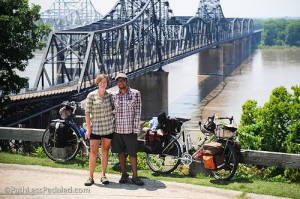
They are in the middle of an “open ended journey” and they are doing it on bicycles. When we saw them they had their Brompton folding bikes with them preparing to ride the Adventure Cycling Northern Tier route. I wish them luck and will be following their adventures.
